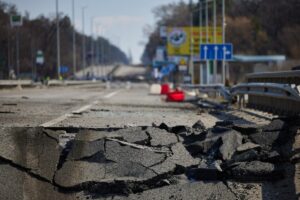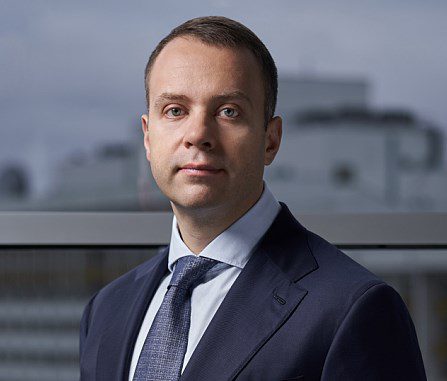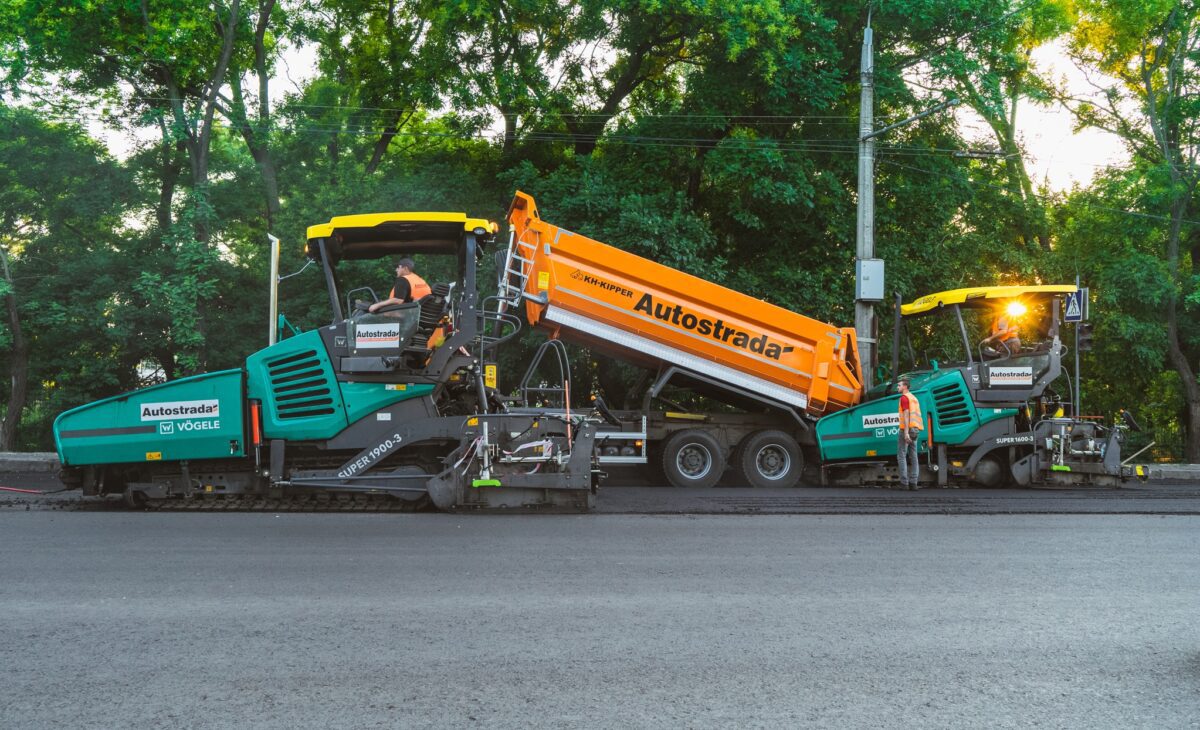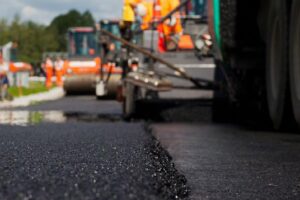
The European Investment Bank (EIB) is considering providing Ukraine with EUR220 million for infrastructure restoration, including road and bridge repairs, the State Agency for Infrastructure Restoration and Development of Ukraine has reported.
According to a Facebook post on Wednesday, the possibility of financing reconstruction projects and the progress of their implementation were discussed with EIB representatives by the agency’s head Mustafa Nayyem and head of the project management team Vadym Nozdria.
As a reminder, in June 2023, the EIB allocated EUR 50 million of EU grant funds under the NIP platform for modular bridges for the regions of Ukraine most affected by the Russian invasion.

On April 28, 39 systems of automatic registration of violations will start working on the roads of Ukraine. Four of them will be new, first deputy head of the Patrol Police Alexei Beloshitsky said.
“From April 28 on the roads of Zhytomyr, Ivano-Frankivsk, Kyiv, Kremenchug, Lviv, Mukachevo, Poltava, Chernivtsi, Cherkasy, Vinnitsa, Volyn, Ivano-Frankivsk, Kyiv, Kirovograd, Lviv and Rivne regions will resume the work of 35 complexes of automatic fixation of offenses (which worked before the full-scale invasion of the Rascists), and in Dnipro and Kremenchuk will work four new control devices,” Beloshitsky wrote in Facebook on Friday.
According to him, all these complexes will work to fix the most common cause of traffic accidents – exceeding the permitted speed limit.
The first deputy head of the Department of the Patrol Police gave the location of these complexes. In particular, there will be three such cameras in Ivano-Frankivsk and Kremenchuk, two cameras – in Kyiv, Lviv, Poltava and Dnipro, one camera – in Zhytomyr, Mukacheve, Chernivtsi and Cherkasy. Outside communities the largest number of such cameras will operate in Lviv (11) and Kyiv (4) regions. One camera each in Vinnitsa, Ivano-Frankovsk, Rivne and Kirovohrad regions, and two cameras in Volyn region.
As it was reported, cameras of automatic fixation of traffic violations began to work in Ukraine since June 2020, which, according to the Ministry of Internal Affairs, allowed several times to reduce the number of accidents and fatalities in accidents. After the start of a full-scale Russian invasion, the cameras were disabled, but in May 2022 Biloshitsky reported that 128 cameras resumed work in 20 cities and outside settlements in 10 regions of Ukraine.

– How has the road construction market changed in recent years?
– Fundamental changes have taken place with the adoption of the law on the road fund in 2016. This became the foundation for the development of road construction and, in fact, the planning of costs for the road industry began. But we understand that the amount of excise tax that exists today is absolutely insufficient to fully restore the road infrastructure and start building new roads from scratch. We need additional funds and investments.
The Big Construction program launched an even larger-scale renovation of highways, in the two years of its operation, a large number of highways have been repaired. Companies saw prospects in this direction, began to invest heavily in material and technical bases, and to increase their staff.

– And what is the current competition in the market?
– Now in Ukraine there are about 100 road construction companies. At the same time, we must understand that we have companies that build only local roads, there are those that build roads of national importance, and those that participate in international tenders. Each of these areas has certain qualification requirements for companies. When it comes to international tenders, they take experience from the last five years and the requirements are very strict, since they are determined by the World Bank or the European Bank for Reconstruction and Development. And although there are a large number of participants on the market, such projects can be implemented by a small number of companies. There are 50 companies currently operating on national roads, others on local roads.
Today there are several business associations on the market that are actively involved in the topic of road construction. How effective are they at all? In particular, I mean the National Association of Road Builders, where you are vice president.
The purpose of creating any association is to communicate with government authorities, promote and defend the positions and values of development of the industry and its member companies. It is for this purpose that the National Association of Road Builders was created, and to a certain extent it does all this.
– Why did you leave it?
– Today I am the head of the Infrastructure Development Committee of the Federation of Employers of Ukraine. This committee includes railways, ports, aviation, and road construction, that is, an integral complex. Since the sphere of my interests is not only road construction, but others as well, I believe that I can fulfill my function more effectively and broader, being the head of this particular committee. In addition, the Federation of Employers is a body present at government meetings, various initiatives, bills are coordinated with it, and innovations are discussed.
For me to be both there and there was a kind of ‘diffusing’ efforts, which, in my opinion, never leads to maximum efficiency. Therefore, I made the appropriate choice.
– Let’s talk about Autostrada. In which regions of Ukraine does your company operate? Are you planning to expand your presence in the regions in the near future?
– The company now operates in 11 regions, but if necessary, it can quickly deploy production facilities in any of the regions, and not only in Ukraine. Our 20 asphalt concrete plants are mobile, like other units of the material and technical base. Now we are present in the regions where tenders have been won, contracts have been signed and there are specific volumes.
Regarding whether we plan to extend: now – no, because the market is already very competitive, in each region there are five or six companies. Go to some region and become the seventh or eighth company there? I don’t think this is advisable. Perhaps in some regions there will be large projects, such as the Kyiv circular road. If this project is launched, it will require a concentration of really powerful market players to be implemented in the shortest possible time. So even if we are not present, we will mobilize and participate.

– Autostrada has recently launched mobile laboratories to control the quality of road construction. Tell me, how effective is it? What are the results? And if you can tell how much money was invested?
– The launch of mobile laboratories was a stage in the global quality control program of the Autostrada group of companies. In Vinnytsia region, we have launched a central laboratory equipped with the most modern equipment. We have invested more than EUR3 million in it alone. The cost of one mobile complex is more than EUR500,000.
Speaking about the advantages of mobile laboratories over stationary ones, mobile ones allow conducting research directly on the construction site, that is, no time is wasted.
In road construction, there should be good collaboration between the quality department employees and the road builders themselves. It’s like a technologist who controls the baking of bread: he doesn’t have to come and say that something is wrong. He has to make sure that the final product is correct. That is, the quality department, like the road workers, is responsible for the final product. And this is the main goal. Today I can say that there is such a collaboration, and our quality department is the most equipped and professional among all road companies.
– How many laboratories do you have in total?
– We have 20 production laboratories, two mobile laboratories and one central laboratory.
– Are you going to increase the number?
– Our task is not in quantity, but in quality.
– If we are talking about machinery, how much equipment do you have and what kind?
– From the first days of creation of the company, we have exclusively our own equipment from the world manufacturers. In road construction, for example, we give preference to WIRTGEN mechanisms. This leads to a quality and smooth workflow. As a result, when we take an object, we commission it on time or ahead of schedule. If something goes ahead of schedule, but somewhere we do not have time, we can transfer people and equipment from one facility to another, strengthen and complete the object according to the schedule. Therefore, from the first days of the company’s work, the question of our own fleet of equipment was important for us.
– Regarding the staff. How many road workers are there in the company now? Do you feel a shortage of any specialists?
– I’ll give you an example. I have a former partner with whom we launched the Bekhy quarry together. At the first stage, he was one of the founders of the Autostrada company, and now he is building roads in other countries. His financier calls me on the phone and says: “What about your people? What are the wages?” I name the wages, he says: “You know, we have had a very large number of workers from Ukraine for years. Today, practically no one came to us to work, because there is work in the road sector in Ukraine.”
I think that the first factor is that people who have been abroad have returned, because after all, this is their home, their families are here. And for them, if there are decent conditions in Ukraine, it is better to be at home, to work here.
The second factor is that wages have really increased, significantly. And those people who were in other professions, but want to develop, today re-profiled and became road workers. But there is indeed a personnel problem, it is acute, and it cannot be solved until tomorrow. It needs a strategic approach primarily at the state level.
The Autostrada group of companies now has more than 5,000 employees, but we work with almost all specialized educational institutions, take students for practice, and keep the best ones. That is, systematic work is underway here.
– But as far as I understand, the trend with personnel is, in principle, going to improve …
– I believe that the road industry has passed the peak of personnel problems.
– You say that wages are growing. How have they grown over the past year?
– I cannot say in terms of the year, but I think that in the last few years they have doubled.
– And what is the average wage?
– During the season we have a wage of UAH 40,000, maybe more. It depends on qualifications, performance, the number of hours worked.
– Please tell us about your main objects for today – roads, bridges.
– Today we have two areas of activity. The first is road construction. And the second direction is bridge construction. There is also winter maintenance. In each area, there is a full cycle of our own production, a staff of highly qualified specialists and all the relevant mechanisms in the fleet of equipment, which allows us to implement objects of any level of complexity on time and with high quality.
One of the key ones today: we have restored the P-08 highway leading from Nemyriv to the border with Moldova. Some 125 km of this highway and two territorial roads were repaired in 90 working days. They worked around the clock, 12 asphalt pavers and six asphalt concrete plants were involved.
The continuation of the P-08 road is the Yampil bridge, which directly connects Ukraine and Moldova. We must also implement this project. There were delays due to the finalization of the points of contact from the Moldovan side. A week ago, everything was agreed. Now we expect that the corresponding intergovernmental agreement will be approved and we will begin construction work, because the main preparatory work is practically completed. We bought out the land – there was private land there, shares, hazels. Now we are changing the purpose, making all the permits. As soon as the point is approved, we will immediately start drilling wells (we have drilling equipment) and make supports.
– Can you clarify the timing? When is the bridge to be completed?
– I think that due to delays in agreement on the connection point, we will not finish until the end of 2022. It is more realistic in 2023.
And the second project, if we take bridges, is the Darnytsky Bridge. For more than 10 years, the ramps to the left bank have not been built. We must complete these ramps by the end of next year. We work around the clock. But there are also many questions there, because many ramp construction projects were lost. In addition, there are questions about examining the existing structures that have simply stood without proper maintenance for about ten years. Now we are doing everything simultaneously there.
– What other objects do you have?
– We have a number of roads of national importance. This, in particular, is the H-07 Kyiv-Sumy road. We have set a goal to complete the main work this year. There are about 80 km across Chernihiv region.
We’ve completed work on H-08 – this is the road in Cherkasy region. We are completing work on H-16 in the same region.
In addition, there are a number of sections on international highways. On the M-30, the longest highway in the country, the Kropyvnytsky bypass road was restored. There are also facilities on the M-21 highway in Zhytomyr and Vinnytsia regions, they are almost ready.
In Mykolaiv region we are restoring the road to the sea. In Kherson, we have repaired the entrance to the airport and we are working on the approach to the city on the M-14 highway.
We have important, strategic objects at every site, in every region. And there is no such idea that this is a local road and it is not important.
– As for bitumen. Do you feel its deficit and what is needed to diversify supplies to Ukraine?
– We do not feel deficit in the company. We always have stocks for five to ten days, which are located in the territory of Ukraine. But in general, in order to diversify completely, we should do several things in the country. Strategically – we need to have own bitumen production, as well as the production of high-quality petroleum products. Ukraine cannot but have it. I think there should be an appropriate government policy, because the fact that we buy bitumen abroad is a big minus. This is speaking globally.
If we take today, situationally, we should have the capacity for transshipment of oil products in ports. Not exporting something, but accepting it. In this matter, I think, it is necessary to strengthen, so that Ukrainian ports can provide the Ukrainian market.
– Now the issue of concession is very topical. In your opinion, how realistic is it with us, and is your company interested in concession?
– It is interested. Concession is a topical issue. Our roads are congested. We need not only to restore, but also to build new ones. In particular, we need to connect Europe with port cities by autobahns, to connect the capital with the regional centers, at least with those with almost a million people – Lviv, Dnipro, Odesa, Kharkiv … There should be partnership between state and private companies.
– Are you going to participate in tenders that are planned to be announced next year?
– We do not yet know the qualification requirements. If Autostrada meets them, then I think that yes, we will participate.
– And what tenders are the most interesting for Autostrada and why?
– For the Autostrada company it looks like this. We have a plant, it has a radius of 150 km. In this radius, we participate in all tenders. And if there are tenders that are further, then we do not participate, because then the asphalt delivery time according to the norms is more than three hours, and it becomes cold. This is technologically wrong. For us – both technically and in terms of the cost of logistics – it will be unprofitable to transport. Therefore, all tenders that are within the reach of factories are interesting.
– How is the payment for work on tenders carried out now? Are there no delays?
– It’s like being in a family. There are different circumstances, but we always try to find compromises, to meet halfway, to understand where we can allow postponement, and where due to the fact that we do not have working capital – no. I cannot say that there is some kind of system delay. To say that everything is in advance and all advances have been paid, but the funds are lying and waiting – also not. There is a certain reasonable balance that is maintained in this direction
– And with what financial indicators do you plan to end this year? I mean income, profit …
– If to look at the investments in Autostrada, I think that they are unprecedented for the road industry in Ukraine, and they will be justified by the volumes that Autostrada is currently fulfilling. So far, I cannot say what exactly the indicators will be, because the year has not ended yet, but I think that they will be like that of a company that is one of the leaders in the road construction market in Ukraine.
– Are you planning to enter other countries, international markets?
– We would like to diversify, but today it is important to fulfill qualitatively the contracts that we have in Ukraine. Therefore, entering the international market is not on the agenda now. But I am sure that over time we will work in other countries.
– And the last question. In addition to road construction, you are also engaged in logistics and agricultural business. How are these business directions developing now?
– The companies are united in the MS Capital holding, they complement each other and work in synergy. For example, the products of the Bekhy granite quarry are supplied for the needs of the Autostrada group of companies, ensuring the stable availability of crushed stone materials used in road construction. First Logistic Company, in addition to its core business – transportation of grain, is also engaged in providing transportation for the Bekhy quarry and Autostrada.
The agricultural business has shown good yields this year, besides, the prices for corn and sunflower are high. Accordingly, this is a fairly successful period for this segment. The situation with the automotive business is somewhat worse (the Audi dealer center in Odesa), since due to the lack of chips there are significant delays in the delivery of cars.
The year was tense, but all the tasks were achieved by the MS Capital team. In general, 2021 is productive for us.
BRIDGES, LARGE CONSTRUCTION, MAKSYM SHKIL, ROADS, АВТОСТРАДА
Avtostrada, one of the leaders of road and bridge construction in Ukraine, has signed the dual education program agreement with the Kharkiv National Automobile and Road University.
 The dual education program is the combination of studying in professional technical educational institutions with work in road construction companies. In Ukraine, there are only a few similar educational programs, which are being implemented, aimed at eliminating the technical professionals’ lack.
The dual education program is the combination of studying in professional technical educational institutions with work in road construction companies. In Ukraine, there are only a few similar educational programs, which are being implemented, aimed at eliminating the technical professionals’ lack.
Starting from the 2022/2023 academic year, KhNADU students will be able to work on the roads and bridges of Avtostrada during their studies. The company has received more than 100 applications for participation in the program. The harmonization of the study format, curricula, and student assessment criteria is currently being finalized.
Dual education, which was first introduced in Germany in the 1960s, is now widely practiced in a number of European countries. For Ukraine, it is a know-how that is only gaining momentum. Avtostrada is ready to adopt the European approach and promote the project by transferring its best practices to educational institutions in order to bring the educational process to a qualitatively new level. This will help students to get deep knowledge of modern technologies and innovations used in road construction, and gain working experience with the latest technology.
This approach will allow training professionals who need both the company and the market. Students will receive all the necessary skills and will be able to work in the relevant sphere.

“Participation in the dual education program is a continuation of Avtostrada’s systematic approach to employees’ development. We have internal programs for staff development and training, internships, special internships with a guaranteed social package, as well as scholarship initiatives. Avtostrada updates the technical base of specialized educational institutions. Employees of the company share their experience with students at open lectures, meetings, and study tours to the company’s production facilities. Our goal is to popularize the profession of a road worker in order to help train a new generation of professionals and eliminate the “staff shortage” in the industry”, said Kateryna Vasyuta, HR Director of Avtostrada.
According to the rector of KhNADU Viktor Bogomolov, the implementation of the dual education program will bring the training of future road workers to a qualitatively new level and increase the institutional capacity of the university. “We have a strong educational base and strive to give our students the most up-to-date knowledge. Launching a dual form of training in cooperation with Avtostrada, one of the most innovative companies on the market, is an opportunity for our students to gain the full range of practical skills they need. Participants in the program will have exactly the experience that will allow them to succeed in the profession. About 50% of the internship will be the process of learning on-site. This internship will bridge the gap between the theory in lectures and the modern realities of the profession”, said Victor Bogomolov.
Avtostrada has been cooperating with Kharkiv National Automobile and Road University for a long time. The company employs almost 50 graduates of KhNADU, 35 of whom hold senior positions. Half of those who completed the training course was transferred to the positions of engineering and technical workers. Also, Avtostrada employees are undergoing advanced training at KhNADU, and employees of the university are involved in providing scientific and technical support for road construction projects of Avtostrada.
For reference
Avtostrada Group of Companies is one of the leaders in the road construction sector, a powerful modern Ukrainian company that has its own production chains and is part of MS|Capital holding. The company carries out major repairs and construction of roads and bridges. It owns more than 2.5 thousand units of specialized equipment and has a team of 5.5 professionals.

The Cabinet of Ministers of Ukraine has allocated additional UAH 3.5 billion to local budgets for highways; this is about an additional amount of subventions from the national budget for public roads of local importance, streets and roads of communal property in settlements.
The relevant decision was made at the Wednesday government meeting.
According to the draft decision, based on the analysis of the rate of receipt of funds from the sources of the formation of the public road fund, it is expected that as of November 23, 2021, the overfulfillment of the annual revenue plan of the public road fund will be UAH 3.5 billion, and on December 31, 2021 it will be UAH 5.8 billion. In this regard, it is proposed to allocate an additional UAH 3.5 billion to finance the construction, reconstruction, repair and maintenance of public highways of local importance, streets and communal property roads in 2021 at the expense of a special fund.

MPS propose to amend the state budget for 2021 and distribute UAH 38.75 billion of additional receipts, including UAH 12 billion for subsidies and UAH 15 billion for the repair of national roads.
Bill No. 6052 was registered by a group of MPs in parliament on Tuesday.
According to an explanatory note to the bill posted on the parliament’s website, it is proposed to increase receipts from corporate income tax – by UAH 30 billion, VAT on imports – by UAH 6 billion, VAT on goods manufactured in Ukraine – by UAH 2 billion, fee paid during the legal process for establishing ownership to cars – by UAH 0.75 billion.
At the expense of these additional receipts, the MPs propose to increase spending on subsidies by UAH 12 billion, to UAH 47.295 billion, according to the bill.
In addition, the MPs propose to provide for an additional amount of funding for the road infrastructure in the amount of UAH 15 billion.
“In particular, in 2021, it is planned to carry out repair and construction work on a total length of 4,500 km of state highways, but the existing funding is currently insufficient to implement these plans,” the authors of the bill said in the explanatory note.
The bill also proposes to send additional funding in the amount of UAH 2.5 billion for the construction of social and cultural facilities, transport infrastructure. Thus, it is proposed to increase the amount of subventions from the state budget to local budgets by the indicated amount.
In addition to this, the bill proposes to allocate UAH 1.5 billion from additional receipts for the construction of projects within the framework of the Big Construction state program.
Another UAH 1 billion is proposed to be used to pay off debts and pay salaries to employees of state-run mines. In addition, the MPs propose to allocate UAH 556 million to replenish the charter capital of the state-owned enterprises Boryspil International Airport, Ukraine state aviation enterprise and Ukrservice of the Transport Ministry.
Amendments to the current state budget also imply the following directions: UAH 282 million to provide housing for 215 internally displaced persons who defended the sovereignty of Ukraine, UAH 280.5 million for timely settlements with dismissed military personnel, UAH 176.8 million for providing prisons with food and settlements for utilities, UAH 86.9 million for a budget program for the development of an emergency medical care system and modernization of the material and technical base of healthcare institutions, as well as UAH 10 million for additional circulations of the Uriadovy Kurier newspaper.